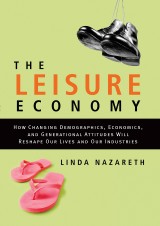Details

The Leisure Economy
How Changing Demographics, Economics, and Generational Attitudes Will Reshape Our Lives and Our Industries1. Aufl.
|
16,99 € |
|
| Verlag: | Wiley |
| Format: | EPUB |
| Veröffentl.: | 25.03.2010 |
| ISBN/EAN: | 9780470675212 |
| Sprache: | englisch |
| Anzahl Seiten: | 288 |
DRM-geschütztes eBook, Sie benötigen z.B. Adobe Digital Editions und eine Adobe ID zum Lesen.
Beschreibungen
For the past three decades, we have been steadily creating an extreme 'time-crunch economy' that has affected jobs, portfolios, businesses and lives. But the 'time-crunch economy' is turning into 'the leisure economy' and it will mean wrenching adjustments for our lives and institutions. Everyone from consumers, investors, businesses, and policy-makers will need to understand the changes afoot. <p><i>The Leisure Economy</i> posits profound economic changes in North America due to both the retirement of the baby boomers and the attitudes of ascendant generations X and Y. Looking at trends in demographics, economics and generational change, this book looks at how to stay ahead of the leisure economy and predicts who will be the winners and losers in the seismic shift ahead.</p>
Acknowledgments. <p>Introduction: A European Life.</p> <p>Chapter 1. the Color-Coded Refrigerator.</p> <p>Chapter 2. Economic Progress and Leisure Ruin.</p> <p>Chapter 3. Time Off for Good Behavior.</p> <p>Chapter 4. In Praise of Slacking.</p> <p>Chapter 5. The New Have and Have-Nots.</p> <p>Chapter 6. Welcome Back, Fido.</p> <p>Chapter 7. Time to Change the World.</p> <p>Chapter 8. Mapping the Leisure Economy.</p> <p>Chapter 9. Spending Time and Spending Money.</p> <p>Chapter 10. Profiting or Losing from the Leisure Economy.</p> <p>Index.</p>
<b>Linda Nazareth</b> is an economist, author, and television journalist who since 1999 has been the in-house economist for Business News Network (BNN), Canada's only all-business television network.
<b>"What will it mean when a society used to being time-crunched finds it is awash in leisure time-and how will that affect the economy?"</b> <p>{For years we have been living in a time-crunch economy. You can see evidence of it wherever you look. Commuters start their treks before sunrise, toting special coffee cups that fit right into the cupholders provided by auto manufacturers. Workers use their breaks to arrange rides for their kids to get to their soccer games, and arrange to pick up other kids on the days that they are in charge of the car pool. Dentists offer appointments at 7:00 in the morning, or 7:00 at night. Fast food, frozen food, restaurant food or simply skipping meals has replaced cooking.</p> <p>"But what if a lot of people suddenly has a lot more time? What if a lot of people wanted a lot more time? What if they started making decisions not on the basis of speed-choosing things that can be consumed or done fast, or which let them do things faster-but on other values? the results would be radical. These consumers would give us a 'leisure economy,' and it would affect everyone from workers to investors to businesses to governments.</p> <p>"In fact, the leisure economy is already in progress, and over the next couple of decades it will only gain steam. If you want to be ahead of the curve, you have to understand why it is happening and what the possible fallout from it will be. Concentrate too much n the time-crunch economy and you may be missing the biggest economic shift to hit North America in decades." - From The Leisure Economy</p>
Diese Produkte könnten Sie auch interessieren:

Sell More With Sales Letters: How to Write Targeted Sales Letters and Convince Your Customers - Incl. Checklist

von: Carsten Meinders, Casey Wayman

10,95 €

















